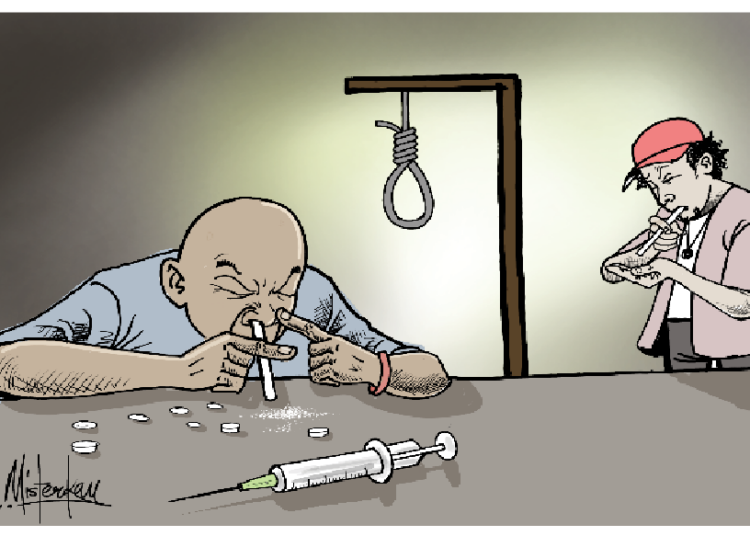The year 2024 was quite hectic for the National Drug Law Enforcement Agency (NDLEA), Nigeria’s public agency, saddled with the task of administering rules against drug trafficking, manufacturing, and sale. The agency’s task included doing all it takes to eradicate the cultivation, processing and trafficking of hard drugs in the country.
Last year alone, the agency arrested 17,670 for drug-related offences, prosecuted 3,427 and rehabilitated 8,129 drug users. The agency seized drugs and other psychotropic substances of about 2,726 837.80 kilograms and destroyed 220 hectares of cannabis farms.
In spite of a series of legislations offering drug control laws and policies by successive administrations, drug abuse remains a grave problem. The story has always turned out to be an enactment of the government’s fantasies, with no tangible result of curbing the production, trafficking and abuse of dangerous drugs and substances in the country.
Scary Data
Nigeria has very appalling statistics of drug abuse. There is a considerable rise in the rate of crime, especially among youths, due to the rising rate of drug abuse.
It is estimated that 15 million Nigerians aged between 15 years and 64 years abuse drugs. And the impacts are visible.
Fundamentally, drug and substance abuse, especially among the country’s largely youthful population, which is increasingly turned into political thuggery, constitutes both present and future danger.
Nothing illustrates this better than the fact that drug use is closely linked to the seemingly intractable incidence of insecurity in different parts of the country. There is clear nexus between drug use and the activities of bandits and other terrorists who attack communities, rape, and abduct citizens.
Chukwuma Okoli and Folahani Aina’s ‘Pills, substances and Brigandage: Exploring the Drug Factor in Nigeria’s Banditry Crisis’ is among a plethora of studies that established a clear nexus between substance abuse and the long years of banditry/terrorism, especially in the northwest. “The (ab)use of drugs and toxic substances by bandits has been a critical catalyst for the banditry crisis in Nigeria”, the authors noted.
The Politicians Are Complicit
During electioneering campaigns, the youths are often fed with drugs and other psychotropic substances and remote-controlled into attacking perceived political opponents and snatching ballot boxes on election day. Under the influence of these substances, they mortgage not just their present and future but the future of the nation.
As a matter of fact, the nation has moved from being a transit point for illegal drugs to a producer, consumer and distributor. Many factors, including what many have described as very weak legislation and the nation’s continued position as a transit route for drug peddlers, contribute significantly to this disturbing position the country finds itself in.
In its 2024 edition of the World Drug Report, the United Nations Office on Drug and Crime (UNODC) said Nigeria and other countries on the continent are increasingly being used as transit routes for cocaine, heroin and other drugs. How best can the nation address this?
Clearly, one way is to take sterner measures against drug dealers. The call by the Director-General of the National Agency for Food and Drug Administration and Control (NAFDAC), Prof Moji Adeyeye, for the death penalty for fake drug dealers readily comes to mind. It is crystal clear that those who deal with counterfeit products, cocaine, heroin, cannabis and other psychotropic substances, are mass murderers. And killers don’t deserve to live.
Needed: Another Law
Professor Adeyeye’s call makes me reflect on last year’s national assembly amendment of the NDLEA Act. Of course, during the legislative process that culminated in the amendment, the Senate made and adopted a recommendation for the death penalty instead of life imprisonment for drug peddlers.
Unfortunately, while the Senate proposed a death sentence, the House of Representatives opted for a life sentence for convicted drug offenders.
It was at the point of harmonizing their positions that the lawmakers wasted the opportunity of sending a strong message to illicit drug traffickers and users.
Adopting the report of a conference committee of the two chambers, the National Assembly opted for life imprisonment, and what we have, which is awaiting the president’s assent, is a law that provides that: “Anybody who is unlawfully involved in the storage, custody, movement, carriage or concealment of dangerous drugs or controlled substances and who, while so involved, is armed with any offensive weapon or is disguised in any way, shall be guilty of an offence under this Act, and liable on conviction to be sentenced to life imprisonment.”
Laws are subject to amendments, and there is no limit to the number of times a law can be amended. There is a need to tweak the current legislation to provide for the death penalty not just for dealers of fake drugs and other products but also for peddlers of illicit drugs and other psychotropic substances, as only a strict penalty will deter drug peddlers.
The whole essence of the proposed capital punishment, which also applies to manufacturing, trafficking, dealing in or delivery of hard drugs by any means, is to serve as a deterrent to drug traffickers.
As of the end of 2023, 34 countries, including Bahrain, Bangladesh, China, Egypt, Indonesia, Iran, Iraq, Kuwait, Lao PDR, Malaysia, Pakistan, State of Palestine, Saudi Arabia, Singapore, Sri Lanka, Thailand, United Arab Emirates, Vietnam and Yemen, retained the death for drug offences. And about 467 drug-related executions took place across the globe.
It is true that some of these countries still battle drug issues, suggesting that while capital punishment is essential, it is not a guarantee that the menace will be totally eliminated. To the extent that law exists to essentially serve as a deterrence, there is the need for Nigeria to toe the line of these nations.
With the devastation brought on Nigeria by the menace of illicit, fake drugs and adulterated products, the nation’s lawmakers must take another look at the amended NDLEA Act, which is awaiting the President’s assent and make sure an unambiguous provision is made for the death penalty as the maximum punishment for drug dealers. But will the NASS do that?
Nigerians believe that the decision of the lawmakers to make life instead of death sentence the maximum punishment for drug dealers may be in the enlightened self-interest of the nation’s politicians, most of whom are guilty of supplying drugs to youths, especially during campaigns.
One thing is certain. Those who deal in fake, substandard and banned drugs/substances are killers who endanger the lives of the present and future generations of Nigerians. They deserve nothing short of the death penalty.
A Joke Taken Too Far
That proposal for 31 additional states is a complete joke, pure and simple. And it shows how unserious some Nigerians can be. How else can one explain the demand for more states when poor governance has rendered some of the current ones economically unviable? A report by BudgIT revealed that 32 states relied on allocations from the Federation Account Allocation Committee for at least 55 per cent of their total revenue in 2023.
Were they to be business entities, most of the Nigerian states would have filed for bankruptcy because, taking out the national cake that is shared at the end of every month, more than half of the states cannot generate enough revenue to barely pay salaries. Well, the truth is what the nation needs the most is not additional states but good governance at both the national and subnational levels.




